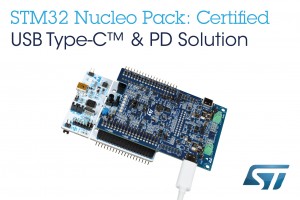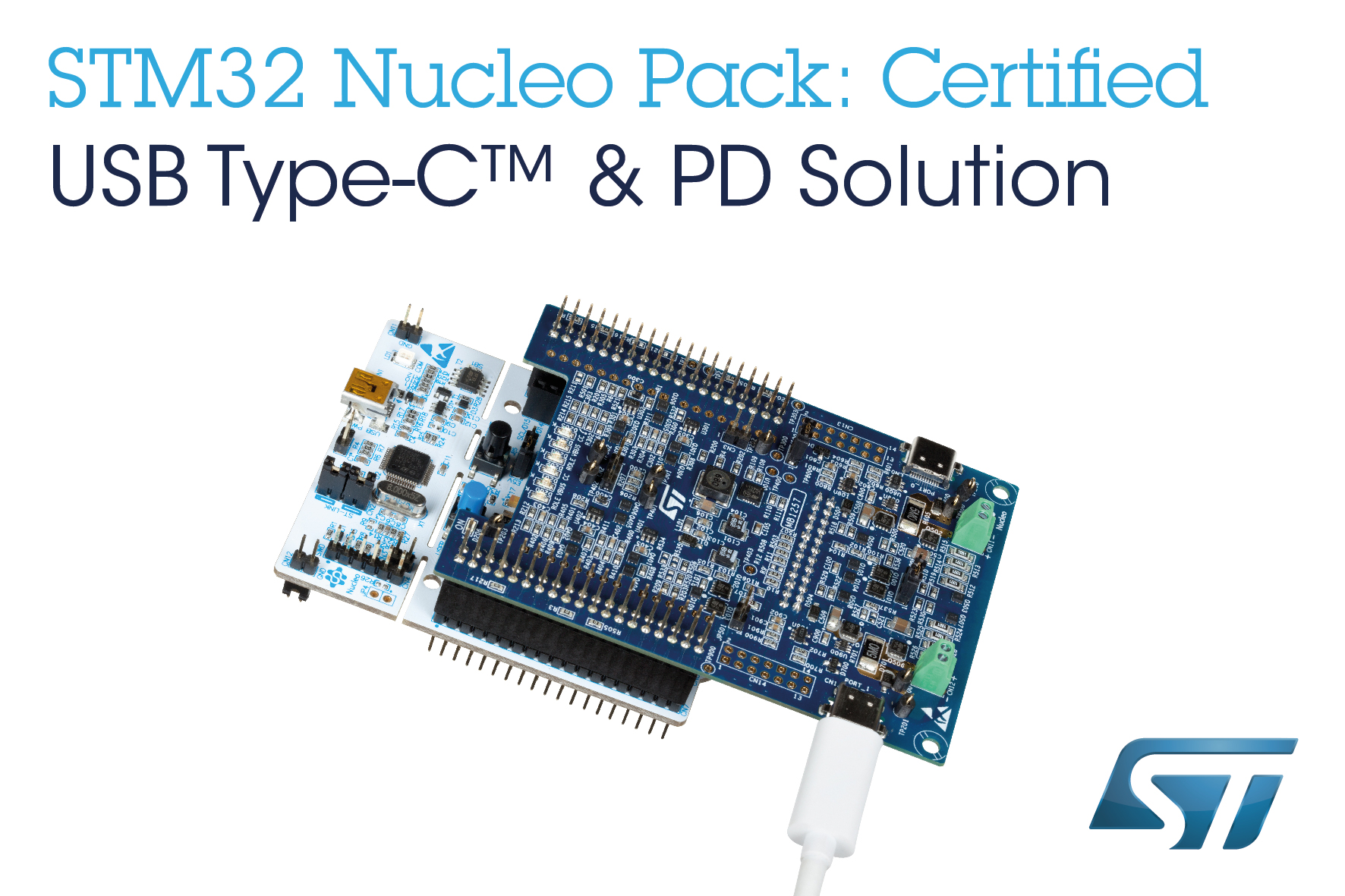Moving towards fewer cables, fewer connectors, and universal chargers
As electronics companies worldwide increasingly look to  implement the new USB Type-C™ and Power Delivery (PD) technology, STMicroelectronics, a global semiconductor leader serving customers across the spectrum of electronics applications, is making the task easier with a certified embedded software solution based on its industry-leading STM32 microcontrollers. The free STM32 USB-C and PD Middleware Stack is compliant with USB Type-C 1.2 and USB Power Delivery 2.0 specifications, enabling customers to rapidly deploy this new technology in their end-products, exploiting the rich feature set of the Company’s STM32 ARM® Cortex®-M based microcontrollers.
implement the new USB Type-C™ and Power Delivery (PD) technology, STMicroelectronics, a global semiconductor leader serving customers across the spectrum of electronics applications, is making the task easier with a certified embedded software solution based on its industry-leading STM32 microcontrollers. The free STM32 USB-C and PD Middleware Stack is compliant with USB Type-C 1.2 and USB Power Delivery 2.0 specifications, enabling customers to rapidly deploy this new technology in their end-products, exploiting the rich feature set of the Company’s STM32 ARM® Cortex®-M based microcontrollers.
-
The new firmware stack, X-CUBE-USB-PD, initially based on the STM32F0 entry level Cortex-M0 processor, allows designers to upgrade their USB legacy devices to provide significant benefits to their end users. USB-C together with Power Delivery technology provides a reversible connector, the ability to carry all necessary data (including video or proprietary protocols), and up to 100W of power to supply or charge equipment connected to the USB port.
“Our USB-C and Power Delivery stack is a perfect example of why the STM32 family has been so successful and sets the standard for embedded processing, from the smartest phones and tablets to the smallest Internet-of-Things applications,” said Daniel Colonna, Marketing Director, Microcontroller Division, STMicroelectronics. “It offers the world’s widest range of price/power/performance options for the de facto industry-standard embedded-processor architecture, backed up by a comprehensive design ecosystem that includes no-cost software and low-cost development boards that minimize time to market and maximize ROI.”
An important benefit in terms of cost and PCB footprint is that solutions using the STM32 with the stack require only a very simple Analog Front End comprising a few passive components, because it fully exploits STM32 embedded features such as comparators, ADCs, timers, and Direct Memory Access.
Other key technical features and benefits of ST’s solution include:
Support for up to two USB-C ports (provider, consumer, or dual role);
-
Cable-insertion detection, plug orientation;
-
Identification of the role of the port partner attached and its current capability;
-
Vbus Power negotiation via Power Delivery communication protocol;
-
Vendor-Defined Messages are handled to identify device or cable ID or to manage Alternate Mode commands;
-
Maximum flexibility and adaptability versus evolving specification changes, as firmware upgrades are possible during the application lifetime;
-
The processing bandwidth and available resources allow the MCU to perform other application-specific tasks, such as power-management control, USB2.0 communication, and/or voltage and current monitoring, on top of its USB-C functionality;
-
Software library provided in the X-CUBE-USB-PD software expansion is fully in line with STM32Cube APIs (HAL – Hardware Abstraction Layer), ensuring easy switch across different STM32 series;
-
Best time-to-market with market-proven solutions already deployed by industry leaders.
ST supports the new USB-C technology with an STM32 Nucleo Pack as a discovery and development tool to minimize design effort. The pack includes a NUCLEO-F072RB board, a USB-C and PD expansion board, and a full-featured USB Type-C cable. The expansion board features two Dual-Role Power USB Type-C ports with a discrete Analog Front End.
The STM32F0 USB-C and PD Nucleo Pack (P-NUCLEO-USB001) is available now at a unit price of U$49.90.



